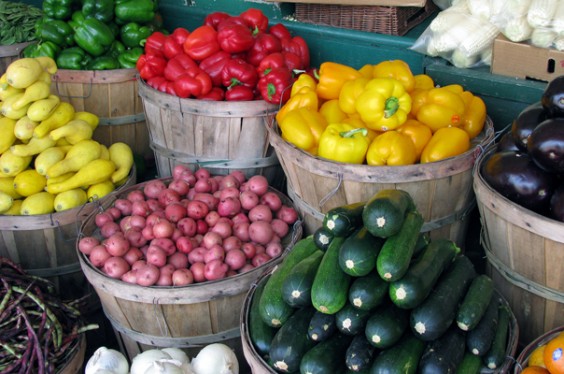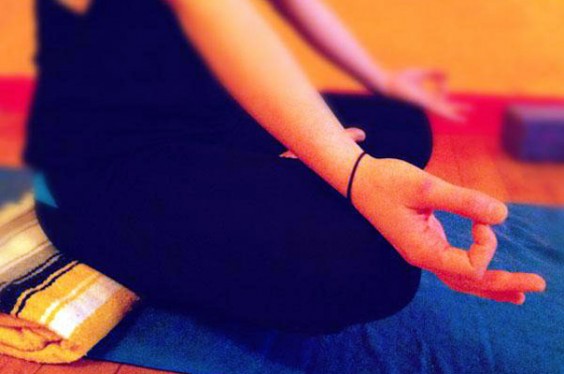How An Eco-Friendly Lifestyle Improved My Health and Happiness (And Can Help You, Too)
 Alden Wicker is a freelance journalist and blogger living in New York City. She writes daily about how to live sustainably — and love life — on her blog, EcoCult.com. When she’s not writing, she’s spinning, practicing yoga, cooking, or dancing all night to electronic music.
Alden Wicker is a freelance journalist and blogger living in New York City. She writes daily about how to live sustainably — and love life — on her blog, EcoCult.com. When she’s not writing, she’s spinning, practicing yoga, cooking, or dancing all night to electronic music.
I was not my best self at the end of college. I had gained 20 pounds over those four years, and I was on medication to deal with acid reflux, which felt like frequent, slow-burning heart attacks. My skin was a mess; I was perpetually broken out. The last few months before graduation were a stressful haze, as I worked hard and partied harder on little sleep. That was four years ago.
It’s not like I didn’t care or was lazy. I read every issue of Self magazine from front to back. I got up early five days a week to pound through long jogs or visit the gym. I even tracked my calorie intake through an online food diary. But it seemed like the harder I tried to lose weight, the more I put on.
That’s not me anymore. After graduation, I moved to New York City to work with a tiny advertising firm focused on eco-friendly brands. I was suddenly surrounded by people living and breathing (and endlessly talking about) sustainability. While I had been aware (and tried some aspects) of the sustainable lifestyle for some time, it didn’t take long to realize I’d only just brushed the surface — there was so much more I could do.
I had an inkling that living an eco-friendly lifestyle might positively affect my health, but up until this point I believed that the more sophisticated and engineered my fitness tools and food, the more advantage I would have in the war against unwanted body fat, breakouts, and malaise. The opposite turned out to be true. Turns out, adopting simpler, earth-friendly health and fitness routines had a bigger impact on my overall wellbeing than any high-tech product ever did. Here are the top three things I changed about my life to live more sustainably and improve my health, and how you can do the same.
1. I sold my car.
 Photo: Zhu
Photo: ZhuFor anyone moving to New York City, it’s a no-brainer to leave a car behind. Parking is massively expensive, and public transportation reaches pretty much everywhere. I also went out of my way to avoid cabs, convincing groups of friends to take the subway together and walking for thirty minutes across town if the subway didn’t connect my two destinations. Eventually, I bought a bike and rode it to work almost every day. The sustainable benefit, of course, was decreasing my carbon emissions.
Walking and biking instead of driving everywhere can (obviously) help slim down a person's waistline, too. But the mere fact of using public transportation helps the average person get in shape. A 2008 study showed that taking public transportation is associated with walking 8.3 more minutes per day on average. Another study showed that the average American public transportation user spends an average of 19 minutes walking to and from transit, and 29 percent of these users achieve their recommended 30 minutes of exercise a day just by going to and from work.
Switching from a car to a bike or public transportation does take some planning, but my advice is to just go for it. There will be some bumps along the way (you'll learn heels aren’t great when running down the Metro steps, or that bike tires get flat when left unused for a while) but if you keep going (even despite the lack of climate control), you’ll figure out your own tricks to arriving at your destination on time.
2. I shopped the farmers' market.
 Photo: NatalieMaynor
Photo: NatalieMaynor
In college, I frequented a couple of local organic stores, but spent my money on organic chocolate-covered raisins, organic cereal, and organic microwavable meals. No wonder it wasn’t helping me lose weight. Some studies have even found that organic labels can trick dieters into eating more calories. But things were different when I went beyond organic and started shopping locally at the farmers' market right around the corner from my apartment.
Farmers' markets have numerous benefits for the environment. They typically allow access to local producers who come from close by (usually within one hundred miles) which means your food required less transportation (i.e., carbon emissions) to get to the kitchen table. They also usually sell produce from small farms that care about their product and the way it was produced. You’ll find grass-fed beef, pesticide-free fruits and vegetables, and heirloom foods that are much more colorful and rich in nutrients than your average grocery store tomato.
Another perk of farmers' markets is that it’s pretty much impossible to put together an unhealthy meal. Sure, you could grab a bag of maple candy or a freshly-baked muffin, but beyond that, you’ll be forced to contend with a bounty of fresh produce, eggs, meats, and cheeses that require washing, chopping, and cooking — without added preservatives, salt, or sugar. Not only did I start eating more leafy greens and omega 3-rich meats, it also got a lot harder to snack on unhealthy items when I returned home late at night (drunk munchies, anyone?). Munching on raw cabbage just isn’t the same as diving into a bag of Cheetos or a box of mac 'n cheese.
As my consumption of sugary and processed foods dropped, I noticed a few things. First, I was no longer thinking about food all the time. Science supports what I found: A new study shows that eating foods with a high glycemic index (such as white bread and candy, which raise blood sugar levels) can trigger cravings for more of the same kinds of foods just a few hours later. Second, my acid reflux disappeared completely, and my skin started to clear up. Third (and most exciting for me), the pounds melted away.
If you’re intimidated by the idea of showing up to a farmers market, a great place to start is by looking up seasonal recipes online or buying a cookbook that's organized by season. My favorites are Clean Food by Terry Walters and Simply Organic by Jesse Ziff Cool. These types of cookbooks will gently guide you into the world of cooking according to what is seasonally available, and eventually you’ll get a feel for it on your own.
If you don’t have a farmers market' nearby, never fear: The tried and true method of shopping the perimeter of the grocery store can force you to follow almost the same healthy rules of eating mostly produce, meat, dairy, and some bread rather than more processed items.
3. I slowed down.
 As I dove further and further into living sustainably, it was hard to ignore the chatter from sustainable blogs and authors about the benefits of meditation. And I soon learned that this isn’t just hippie talk. Some research suggests meditation can change your brain for the better, leading to better regulation of emotions, improved memory, expanded empathy and less stress. Oh yeah, meditation can also help you control your weight by making you more mindful of why you’re standing in front of the fridge (Is it hunger or emotions?).
As I dove further and further into living sustainably, it was hard to ignore the chatter from sustainable blogs and authors about the benefits of meditation. And I soon learned that this isn’t just hippie talk. Some research suggests meditation can change your brain for the better, leading to better regulation of emotions, improved memory, expanded empathy and less stress. Oh yeah, meditation can also help you control your weight by making you more mindful of why you’re standing in front of the fridge (Is it hunger or emotions?).
Incorporating meditation into my daily life did help my stress levels and emotional state, and helped me live more mindfully. I started having internal dialogues as I walked down the street: “Why am I hungry? What am I craving, exactly? What is it that I really want?” More and more, these conversations led to answers I hadn’t found before, like “I actually don’t want anything, I’m just bored.” Or, “I want something sweet; bet I could satisfy that craving with a green apple.”
There are several ways to get started with meditation. You can sign up for classes at a local yoga or Buddhism center. Or you can try an app like Headspace, which walks you through ten minutes meditations, carefully explaining how to clear your head along the way.
It's Pretty Easy Being Green — The Takeaway
When I started this journey toward living sustainably, I approached it from an altruistic standpoint: I wanted to do something to support the local economy, decrease carbon emissions, and decrease pesticide use, along with too many other eco-friendly goals to name. The fact that I got down to my pre-college weight, cleared up my skin, decreased my stress levels, and vanquished my heart burn turned out to be the happy side effects. Whatever your motivation, trying something new can never hurt — and it might even end up helping you (and the planet) in the long run.
Have something to say? Comment below or join us on Twitter @greatist.
No comments:
Post a Comment